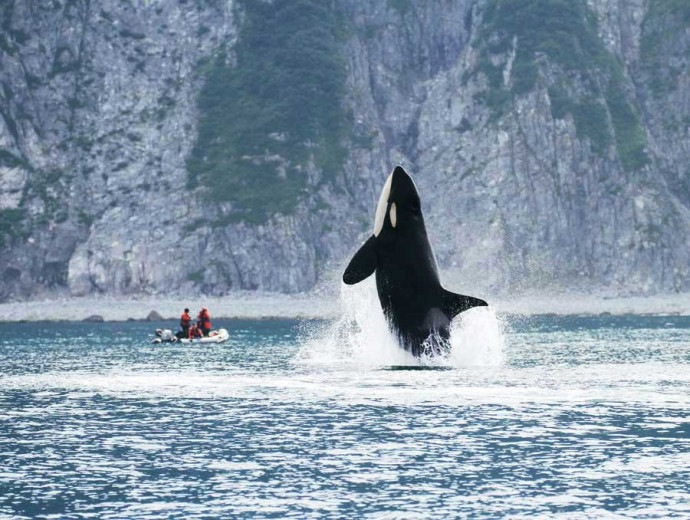Scientists are talking about the unstable state of halibut stocks in the Far East. The main reason is the natural fluctuations in the abundance of this fish. The cunning killer whales also played their role.

Recall that Rosrybolovstvo decided to terminate the halibut production quota agreement with two Kamchatka fishing companies due to the low development of this resource. The fishermen, in their defense, said that their fishing was hampered by killer whales, which had reduced the number of halibut.
We decided to find out the opinion of scientists about the state of halibut stocks and the impact of killer whales on their fishing. For a comment, the editors of the publication “Fisherman of Kamchatka” contacted the Kamchatka branch of the All-Russian Research Institute of Fisheries and Oceanography (KamchatNIRO). Roman Novikov, head of the Marine Fish Laboratory, answered our questions.
According to our interlocutor, the analysis of commercial catches, bottom trawl surveys and mathematical modeling indicate an unstable state of halibut stocks in the Okhotsk and Bering Seas. There is a continuing downward trend in these areas.
The exception is the white-throated halibut of the Sea of Okhotsk, whose numbers have recently stabilized at an average level. Its further growth is quite possible.
Due to the decrease in halibut stocks, the total allowable catch (TDA) also changed from 2022 to 2024. Depending on the area and the type of halibut, the decrease in TDA ranged from 3% to 76.3%.
“The main reason for the decline in halibut stocks in the Okhotsk and Bering Seas is the natural fluctuations in numbers caused by the emergence of low–yielding generations,” Roman Novikov explained to us.
At the same time, killer whales really negatively affect the fishery. In the Sea of Okhotsk, these predators began to annoy fishermen from about the end of the 1990s. Nowadays, they continue to actively devour catches from longline and bottom-netting orders. In all known cases, killer whales ate exclusively black halibut, without touching other fish species.
Killer whales, like many other whales, can dive to depths of up to 600-700 m, where black halibut accumulations are concentrated and where fishing is mainly carried out. In addition, it is known that this species can rise quite “high” into the water column during hunting.
Information that killer whales began to massively overeat longline catches in the Bering Sea was received from fishermen only in 2017. Until that time, there were only isolated cases of killer whales that showed interest in the tiers.
Today, according to preliminary estimates, the number of killer whales affecting the black halibut fishery in the Sea of Okhotsk is about 100-180 individuals. In the Bering Sea, at least 3-4 families, that is, about 20-35 individuals, are engaged in “freeloading” in the bottom longline halibut fishery.
According to Roman Novikov, for many years the ODE of the black halibut has been determined taking into account the predation of killer whales. The biologically justified catch value takes into account possible losses from killer whales. In the Sea of Okhotsk, the total losses during longline and bottom-net fishing of this type are considered to be 33%, in the Bering Sea – 12%.
The “freeloading” of killer whales has been known for a long time and not only in the Far East. They actively interfere with the work of fishermen off the Croiset Islands, Australia, New Zealand, Alaska, the Pribylov Islands, in the Atlantic Ocean and many other areas.
Fishermen and experts from different countries are trying to find a way to deal with marine “freeloaders”. But no effective solution has yet been found.
“In order to minimize losses from interaction with killer whales in domestic and international practice, the effectiveness of some well-known methods was considered: the use of short orders and acoustic devices, changing the sampling rate, changing the area and object of fishing, working with a group of vessels, the use of sound deterrents, satellite tagging of killer whales. However, none of these methods has yet become widespread due to a number of reasons related to the effectiveness and cost of their implementation,” Roman Novikov noted.
Sergey Kostrov (“The Fisherman of Kamchatka”)